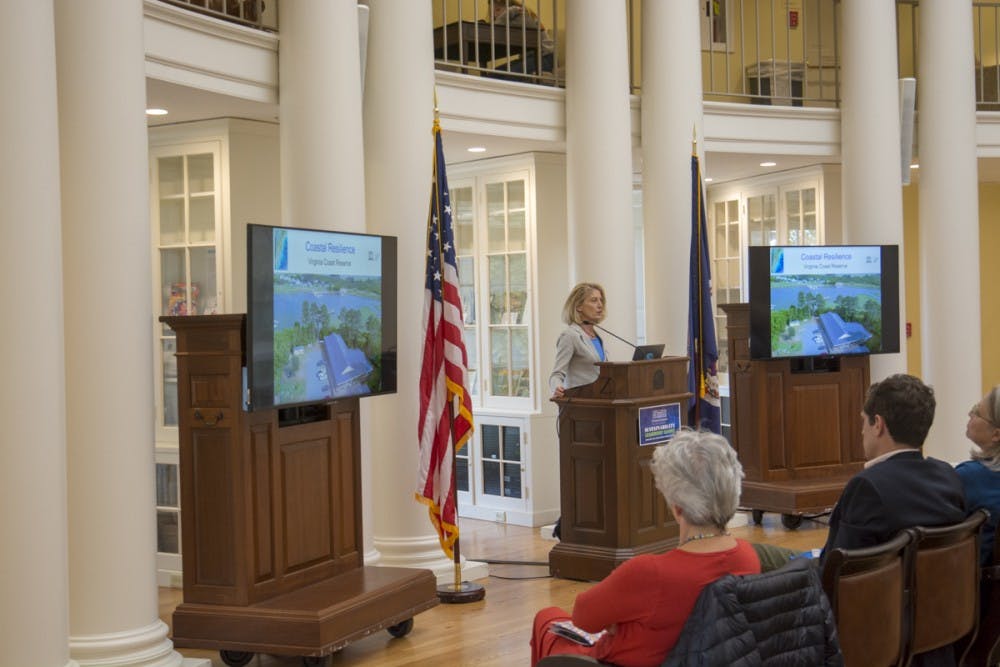In celebration of the University’s Bicentennial, the Office for Sustainability held a summit Sunday to showcase the University’s impact as a leader in sustainability through the initiatives of several professors and faculty members.
Ten faculty members from a range of departments came together at the summit to highlight the importance of research and innovation in food, technology, public policy, climate change and nitrogen emissions.
The professors that spoke at the summit said they are intent on developing ideas that will reduce nitrogen emissions into the atmosphere, prepare for the effects of climate change and create public policies that will make these ideas effective throughout the world. The University itself plans to reduce 25 percent of the nitrogen emissions produced in 2010 by 2020 through the implementation of technologies such as solar panels and the upgrade of buildings on Grounds to be more energy-efficient.
For example, the Delta Force program — the Office for Sustainability's initiative for building sustainability — has performed energy retrofits on over 50 University buildings. The program’s success is best seen in Clark Hall, where the project significantly reduced energy use bytes. Other buildings the program is working on include the Chemistry Building, the Elson Student Health Center, Gilmer Hall and Observatory Hill Dining Hall.
Environmental Science Prof. Jim Galloway highlighted the University’s commitment to leadership in the area of sustainability, specifically citing increasing nitrogen emissions an an ongoing issue that contributes to climate change.
The University acknowledged the issue in 2008 with the creation of the world’s first virtual model to calculate nitrogen usage and emissions, developing a nitrogen footprint for the buildings and facilities on Grounds. As a result of the project, the University’s Board of Visitors set a nitrogen footprint reduction goal of 25 percent by the year 2025.
A nitrogen footprint is calculated through an equation that measures the amount of reactive nitrogen lost to the environment from food intake and energy usage.
According to Galloway, after the first development of the nitrogen footprint, hundreds of institutions in the U.S. and around the world followed the University by example. This nitrogen footprint allows people to observe and determine the issues a community has in terms of emissions.
Andrea Trimble, the director of the University’s Office for Sustainability, said in an interview that one of the central goals of the summit was to look forward and to understand how current actions being taken can help establish a positive visions for the future.
“The University of Virginia is holding the U.Va. Bicentennial Summit as a way of highlighting and showcasing what U.Va. is doing in terms of sustainability, pan-university across disciplines and across topics,” Trimble said.
Additionally, Assoc. Politics Prof. Paul Freedman underscored the importance of food sustainability. He said that exploring food systems at the local, national and international levels is just as important as any other aspect of sustainability.
Freedman is working with the Sustainable Food Strategy Task Force, with the goal of collaborating with faculty, students, the University Health System and the University’s dining services in an ongoing effort to make food that is more healthy, less wasteful and supportive of local producers.
The Sustainable Food Strategy Task Force is in its second year of helping implement the University’s Sustainable Food Action Plan, a plan that outlines how the University aims to meet its sustainable food goals relating to food by increasing the availability of sustainable dining options on Grounds, reducing the overall water and energy consumption of U.Va. Dining overall and promoting sustainable food accessibility on the local.
“We are motivated by the conviction that food can play a central role, has to play a central role in a collective effort to reduce the University’s carbon and especially nitrogen footprint,” Freedman said.
There are many ways that students can get involved academically to learn about sustainability, according to Phoebe Crisman, the director of the Environments and Sustainability track of the Global Studies interdisciplinary major. This interdisciplinary degree program began in 2009, and by 2014, students were allowed to major in Environmental Studies and Sustainability.
Public Policy Prof. Bill Shobe pointed out during the summit that even though most people think that their individual actions is the best way to create change, it is more effective to create new technology and public policy that will benefit the community, the country and the world as a whole.
The University is currently advancing in technology by creating better wind turbines, batteries and biological sequestration methods. At the same time, the University is also working on improving policy. One example is that the Environmental Resilience Institute and the Cooper Center have teamed up to work with local renewal sites in Virginia.
According to Trimble, this year’s Sustainability Summit was made possible by the funding from the Bicentennial itself, along with funding from the University’s Sustainability plan.
“Focusing on U.Va.’s conditions is the wrong place to put our focus,” Shobe said. “We should be focusing on what we can do to reduce emissions using what we do best — the development of new technology and the development of good policy.”







